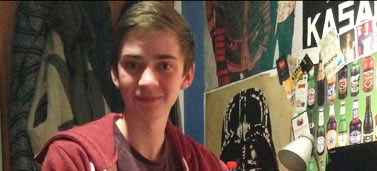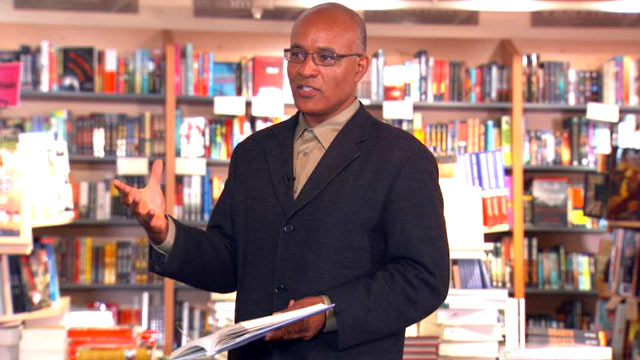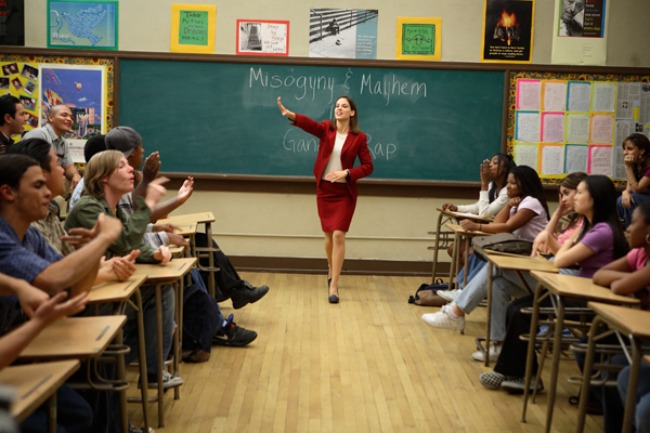‘I think #Students and #Professor should Volunteer’

Medical student Andrew Tindall shares his experiences volunteering in a retirement home, where many of the elderly residents have dementia.
If there’s something familiar about Andrew, it might because you’ve seen him in your living room. In 2012, the then 16-year-old starred on the BBC’s Young Apprentice, reaching the semi-final and impressing Lord Sugar with his sense of humour and sales patter. While he was one of few to win a place in the boardroom, Andrew says volunteering is a rewarding experience that everyone can have.
My voluntary work
“I volunteer at a retirement home every Sunday for two hours, from 11am to 1pm. When I arrive, the residents are still getting up and coming into the lounge, where I chat to them and make sure they’re happy and comfortable. Not many can make conversation, so making cups of tea and checking they’re warm enough is the main priority.
“I’ll then go and visit the residents who can’t leave their rooms, and make sure they’re having a good morning or alert the nurses if there’s something wrong. If the nurses want anything doing, I try to make their job a bit easier – for example, collecting people from their rooms in their wheelchairs and taking them to where they need to be.
“At lunchtime I bring them to the dining room, where I hand out tea and lunch, and help them eat, cutting up their food, chatting and generally just trying to make them have a better Sunday. Normally, families visit later in the day, but some people don’t have any family, so it’s good for them to feel like someone is still there for them.
“Guiltily, I have a few favourite residents! One of them – May – asks my name every time I visit, and we get on brilliantly. She tells me the same stuff every week! She didn’t always used to be like that, she used to remember me, but she’s not very well at the moment.”
Why I volunteer
“I started volunteering at the retirement home while on a three-month placement as part of the Duke of Edinburgh’s Award (DofE) scheme. Some people doing DofE choose to volunteer in charity shops, but as I want to go into medicine, I thought it would be a great idea to get more hands-on experience for my CV.
“When the placement ended, I decided to continue. I’ve been doing it for a year now and I want to carry on until I leave to go to university. I really get a buzz from helping the residents, many of whom need a lot of care, and patient interaction is something I look forward to when I’m older.”
What I’ve learnt about dementia and ageing
“I’ve learnt how dementia affects people and how to deal with it. People joke about dementia being about forgetting stuff, but it’s more than that – it affects people physically, too. With the residents I talk to who are affected, some are deaf, none can hear very well, and some might seem like they’re not very with it. But they do know what’s happening and they’ll know when you’re treating them differently. They don’t turn daft, so I just treat them normally. The worst thing is for them to become depressed. When that happens, you need to keep positive; talk about how great the day is and how bright it is outside.
“I’ve learnt how to talk to them in a way that’s appreciated, to take their mind off things for a while. I’ve got better at it. I can now be in a room with somebody and have a good chat with them for an hour without them realising that I’m desperately trying to get conversation out of them. The ones well enough to chat mostly seem to enjoy reliving the past – the good old days! It’s amazing to hear about the powerful jobs they’ve had. It’s good to talk to them. They’ve had so much experience and, without being too clichéd, we can learn something from them.
“I was talking to a woman today who is 101 years old, but I’d never have been able to tell! She was brilliant and she loves talking about what she’s done. It’s interesting to see how age affects different people: there’s biological age and there’s real age. This lady could still get up and dance, while someone who is 70 might not be able to walk, hear or see. It’s luck in some cases.
“It’s great seeing the residents interact with their families – they really come out of their shells. One lady shouts and screams a lot of the time, but when her family come to visit they talk to her normally and she becomes more like she used to be.
“I’ve noticed that in the Indian culture particularly they respect their grandparents a lot more and always care for them, and I think we should follow that example. I don’t like it when there are families that could visit, but don’t. Given that everyone is living longer, there’s going to be a lot more old people around and using the NHS. We should become more comfortable with their needs and not leave them in a corner and forget about them.”
Volunteering can be challenging
“It can be hard in some situations. For example, before I went on The Apprentice, there was this lovely married couple at the home who did everything together. We’d take them for a stroll together in their wheelchairs, they’d always sit together and have lunch together. When I came back after filming, the lady was sitting on her own and I found out from another resident that her husband had died. She has some form of dementia, and every day she asks where her husband is, which is horrible.
“You can’t mince your words. I’ve learnt how to tell this woman that her husband’s in a better place: ‘in the stars’. I’m quite an emotional person, but I try to follow the example of the nurses in how to connect with people, but not become so attached that I become totally distraught when they die, which is an important skill to pick up in medicine. I admire the nurses and how they can do that.”
I’d recommend volunteering to anyone
“Volunteering enhances you as a person. I think everyone should do it, even if it’s just an hour a week. It’s something different to do – to take your mind off things, and it gives you perspective on life. Also, if you have grandparents who are ill, you’d want someone like yourself or me to be there to talk to them, to make sure they’re happy. It improves the quality of their care. The care I’ve seen is brilliant – the nurses couldn’t do any more, but what could help improve the quality of care is to have more people around to talk to patients, because it really helps.
“If you’re in college and want to go into medicine, this is a great way to get experience and fantastic to put on your CV. Wherever you volunteer, they will appreciate it. My mum’s always drilled into me how important it is to help people, even if you don’t have a lot of time. It’s the percentage of time you can give that’s important. I try my best to go every week, but when I had exams recently the nurses understood that I was locked in my room under books, trying to revise. And when I went on The Apprentice, I clearly had to miss a bit. It is volunteering though, and you just try to come as often as you can.
Getting a placement
“To get a volunteering placement, you’ve got to show an interest and tell them why you want to do it. There might be some hoops to jump through. I approached the retirement home because a friend of my mum’s worked there, but I still had to go to meet them and then have a CRB check [now called a Disclosure and Barring Service (DBS) check] before I could start. I’m also helping primary school children with their computer literacy through my college, so I’m volunteering with people of all ages. You just have to go out and ask.
“I’ve been an outgoing person all my life, but volunteering has enhanced my people skills no end, which has contributed to who I am as a person. It probably helped me when I was on The Apprentice too, even though it was a very different experience!
“You meet such a wide variety of brilliant, honest people when volunteering, and the more circumstances you can throw yourself into, the better a person you’ll become.”
For more information on how to help older people, contact the Royal Voluntary Service.





